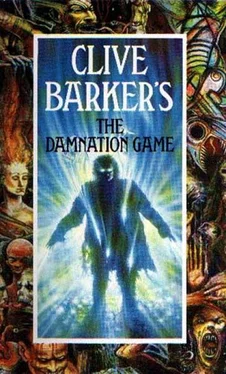Clive Barker - The Damnation Game
Здесь есть возможность читать онлайн «Clive Barker - The Damnation Game» весь текст электронной книги совершенно бесплатно (целиком полную версию без сокращений). В некоторых случаях можно слушать аудио, скачать через торрент в формате fb2 и присутствует краткое содержание. Жанр: Ужасы и Мистика, на английском языке. Описание произведения, (предисловие) а так же отзывы посетителей доступны на портале библиотеки ЛибКат.
- Название:The Damnation Game
- Автор:
- Жанр:
- Год:неизвестен
- ISBN:нет данных
- Рейтинг книги:4 / 5. Голосов: 2
-
Избранное:Добавить в избранное
- Отзывы:
-
Ваша оценка:
- 80
- 1
- 2
- 3
- 4
- 5
The Damnation Game: краткое содержание, описание и аннотация
Предлагаем к чтению аннотацию, описание, краткое содержание или предисловие (зависит от того, что написал сам автор книги «The Damnation Game»). Если вы не нашли необходимую информацию о книге — напишите в комментариях, мы постараемся отыскать её.
The Damnation Game — читать онлайн бесплатно полную книгу (весь текст) целиком
Ниже представлен текст книги, разбитый по страницам. Система сохранения места последней прочитанной страницы, позволяет с удобством читать онлайн бесплатно книгу «The Damnation Game», без необходимости каждый раз заново искать на чём Вы остановились. Поставьте закладку, и сможете в любой момент перейти на страницу, на которой закончили чтение.
Интервал:
Закладка:
There was another, called Curtsinger, a sober-suited individual with an excruciating taste in ties and a worse one in colognes, who, though often in Ottaway's company, seemed far more benign. He was one of the few who actually acknowledged Marty's presence in a room-usually with a small, sharp nod. On one occasion, celebrating some deal that had just been made, Curtsinger had slipped a large cigar into the pocket of Marty's jacket; after that, Marty would have forgiven him anything.
The third face that seemed to be in regular attendance at Whitehead's side was the most enigmatic of the three: a swarthy troll of a man called Dwoskin. Here was a Cassius to Toy's Brutus. His immaculate, pale gray suits, his meticulously folded handkerchiefs, the precision of his every gesture-all spoke of an obsessive whose rituals of tidiness were designed to counter the excess of his physicality. But there was more: an undercurrent of danger about the man that Marty's years in Wandsworth had taught him to be alive to. In fact, it was there in the others too. Beneath Ottoway's frigid exterior and Curtsinger's sugar coating there were men who were not-it was Somervale's phrase-entirely savory.
At first Marty dismissed the feeling as lower-class prejudice; a nobody mistrusting the rich and influential on principle. But the more meetings he sat in on, the more heated debates he was peripheral to, the more certain he became that there was in their dealings a scarcely concealed subtext of deceit, even of criminality. Much of their talk he scarcely understood the subtleties of the stock market were a closed book to him-but the civilized vocabulary could not completely sanitize the essential drift. They were interested in the mechanics of deception: how to manipulate the law and the market alike. Their exchanges were littered with talk of tax avoidance, of selling between subsidiaries to inflate prices artificially, of packaging placebos as panaceas. There was no apology implicit in their stance; on the contrary the talk of illicit maneuvers, of political allegiances bought and sold, were positively applauded. And among these manipulators, Whitehead was the kingpin. In his presence they were reverential. Out of it, as they jockeyed for position closest to his feet, they were ruthless. He could, and did, silence them with a half-lifted hand. His every word was venerated, as if it fell from the lips of a Messiah. The charade amused Marty mightily: but applying the rule of thumb he had learned in prison he knew that in order to earn such devotion Whitehead must have sinned more deeply than his admirers. In cunning, he didn't doubt Whitehead's skills: he'd experienced his powers of persuasion already. But as time went by the other question burned more brightly: was he also a thief? And if not that, what was his crime?
Ease, she came to understand as she watched the runner from her window, is all; if not all, it was the best part of what she delighted in, watching him. She didn't know his name, though she could have inquired. It pleased her more to have him anonymous, an angel dressed in a gray track suit, his breath a flux of mist at his lips as he ran. She'd heard Pearl talk of the new bodyguard, and presumed this was he. Did it really matter what his name was? Such details could only weigh down her mythmaking.
It was a bad time for her, for many reasons, and on those defeated mornings, sitting at her window having scarcely slept the night before, the sight of the angel running across the lawn or flickering between the cypress trees was a sign she clung to, a portent of better times to come. The regularity of his appearance was something she came to count on, and when sleep was good and she missed him in the morning, she felt an undeniable sense of loss for the rest of the day, and would make a special point of keeping her rendezvous with him the next morning.
But she couldn't bring herself to leave the sunshine island, to cross so many dangerous reefs to get to where he was. Even to signal her existence in the house to him risked too much. She wondered if he was much of a detective. If he was, perhaps he had discovered her presence in the house by some witty means: seen her cigarette stubs in the kitchen sink, or smelled the scent of her in a room she had left scant minutes before. Or perhaps angels, being divinities, needed no such devices. Perhaps he simply knew, without the clues, that she was there, standing behind the sky at a window, or pressed behind a locked door when he went whistling down the corridor.
There was no use in reaching for him though, even if she could have found the courage. What would she have to say to him? Nothing. And when, inevitably, he sighed his irritation with her and turned his back, she would be lost in a no-man's-land, isolated from the one place she felt secure, that sunshine island that came to her out of a pure white cloud, that place that poppies bled to give her.
"You've eaten nothing today," Pearl chided. It was a familar complaint. "You'll waste away."
"Leave me be, will you?"
"I'll have to tell him, you know."
"No, Pearl." Carys gave Pearl a pleading look. "Don't say anything. Please. You know how he gets. I'll hate you if you say anything."
Pearl stood at the door with the tray, disapproval on her face. She wasn't about to crumble at the appeal or at the blackmail. "Are you trying to starve yourself again?" she asked unsympathetically.
"No. I just don't have much appetite, that's all."
Pearl shrugged.
"I don't understand you," she said. "Half the time you look suicidal. Today-"
Carys smiled radiantly.
"It's your life," the woman said.
"Before you go, Pearl..."
"What?"
"Tell me about the runner."
Pearl looked bemused: it wasn't like the girl to show any interest in goings-on in the house. She stayed up here behind locked doors and dreamed. But today she was insistent:
"The one who races himself every morning. In the track suit. Who is he?"
Where was the harm in telling her? Curiosity was a sign of health, and she had too little of either.
"His name's Marty."
Marty. Carys tried the name in her head, and it fitted him fine. The angel's name was Marty.
"Many what?"
"I can't remember."
Carys stood up. The smile had gone. She had that hard look that she got when she really wanted something; the corners of her mouth pulled down. It was a look she shared with Mr. Whitehead, and it intimidated Pearl. Carys knew that.
"You know my memory," Pearl said, apologetically. "I don't remember his surname."
"Well, who is he?"
"Your father's bodyguard; he's taken over from Nick," Pearl replied. "He's an ex-prisoner, apparently. Robbery with violence."
"Really?"
"And rather lacking in social graces."
"Marty."
"Strauss," Pearl said, with a note of triumph. "Martin Strauss; that's it.
There: he was named, Carys thought. There was a primitive power in naming someone. It gave you a handle on a person. Martin Strauss.
"Thank you," she said, genuinely pleased.
"Why do you want to know?"
"Just wondered who he was. People come and go."
"Well I think he's staying," Pearl said, and left the room. As she closed the door Carys said:
"Does he have a middle name?"
But Pearl didn't hear.
It was strange, to think the runner had been a prisoner; still was a prisoner in a way, racing around and around the grounds, breathing in clear air, breathing out clouds, frowning as he ran. Perhaps he'd understand, more than the old man or Toy or Pearl, what it felt like to be on the sunshine island, and not know how to get off. Or worse, to know how, but never to dare it, for fear of never getting back to safety.
Now that she knew his name and his crimes, the romance of his morning run wasn't spoiled by the information. He still trailed glory; but now she saw the weight in his body when previously she'd seen only the lightness of his step.
Читать дальшеИнтервал:
Закладка:
Похожие книги на «The Damnation Game»
Представляем Вашему вниманию похожие книги на «The Damnation Game» списком для выбора. Мы отобрали схожую по названию и смыслу литературу в надежде предоставить читателям больше вариантов отыскать новые, интересные, ещё непрочитанные произведения.
Обсуждение, отзывы о книге «The Damnation Game» и просто собственные мнения читателей. Оставьте ваши комментарии, напишите, что Вы думаете о произведении, его смысле или главных героях. Укажите что конкретно понравилось, а что нет, и почему Вы так считаете.








